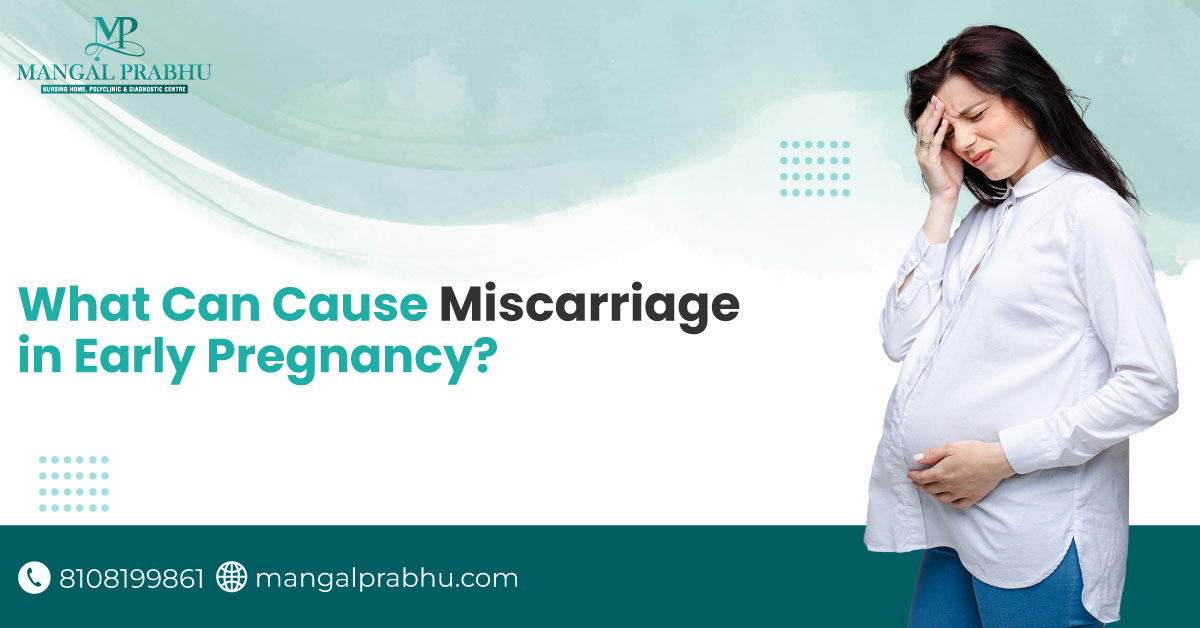
What Can Cause Miscarriage in Early Pregnancy?
Definition of Miscarriage:
It refers to the loss of a pregnancy before the 20th week. It can be a challenging and emotionally taxing experience for couples hoping to start or expand their families. Seeking support from a specialized Pregnancy Care Hospital in Navi Mumbai, such as Mangal Prabhu Hospital, becomes crucial during such delicate times. The compassionate care and guidance provided by experienced professionals in these dedicated healthcare facilities can aid couples in navigating the emotional and physical aspects of miscarriage.
What Causes Miscarriage in Early Pregnancy
A) Genetic Abnormalities:
The majority of early pregnancy miscarriages are attributed to genetic abnormalities in the developing embryo or fetus. These abnormalities disrupt the normal progression of pregnancy, hindering its viability.
B) Hormonal Imbalances:
Maintaining a healthy pregnancy relies on intricate hormonal balance. Disruptions in these hormonal levels can impede the normal development of the embryo, increasing the risk of miscarriage.
C) Infections:
Certain infections, whether bacterial or viral, directly threaten the developing fetus. It can compromise fetal health and contribute to the occurrence of miscarriage.
D) Structural Abnormalities:
Issues within the uterus or cervix’s structure can disrupt the embryo’s proper development. Structural abnormalities create challenges for the embryo to implant and thrive, potentially leading to miscarriage.
Also Read: A Guide To Having A Healthy Pregnancy: Essential Antenatal Advice For Mothers
Risk Factors
- Age: Advanced maternal age, especially over 35, increases the risk of miscarriage. Similarly, very young maternal age can also be a factor.
- Health Conditions: Pre-existing health conditions like diabetes, autoimmune disorders, or thyroid problems may elevate the risk.
- Use of Drugs or Alcohol: Substance abuse, including the use of tobacco, alcohol, or illicit drugs, can significantly increase the likelihood of miscarriage.
- Exposure to Certain Environmental Factors: Prolonged exposure to environmental hazards, such as radiation or toxic chemicals, may contribute to miscarriage.
Signs and Symptoms
1) Vaginal Bleeding:
One of the most common signs of a miscarriage is vaginal bleeding. While not all bleeding leads to a miscarriage, it is a concerning symptom that requires immediate medical attention.
2) Abdominal Pain:
Persistent abdominal pain, especially if accompanied by cramping, may indicate a potential miscarriage.
3) Back Pain:
Back pain, particularly in the lower back, can be a symptom of miscarriage. It is essential to consult with an obstetrician in Navi Mumbai, such as those at Mangal Prabhu Hospital, if experiencing such symptoms.
Prevention
i) Healthy Habits:
Adopting a healthy lifestyle, including a balanced diet, regular exercise, and avoiding harmful substances, can contribute to a healthier pregnancy.
ii) Regular Prenatal Care:
Early and consistent prenatal care is crucial for monitoring the health of both the mother and the developing fetus. Visiting a pregnancy care hospital, like Mangal Prabhu Hospital, ensures proper guidance and monitoring.
Conclusion
While not all miscarriages can be prevented, understanding the causes, risk factors, and signs can empower expectant parents to make informed decisions and seek timely medical attention. Consulting with a knowledgeable obstetrician in Navi Mumbai and prioritizing regular prenatal care are essential steps toward promoting a healthy and successful pregnancy journey. Miscarriage is a complex and emotionally sensitive topic, and support from healthcare professionals and loved ones plays a pivotal role in navigating through such challenging times.
